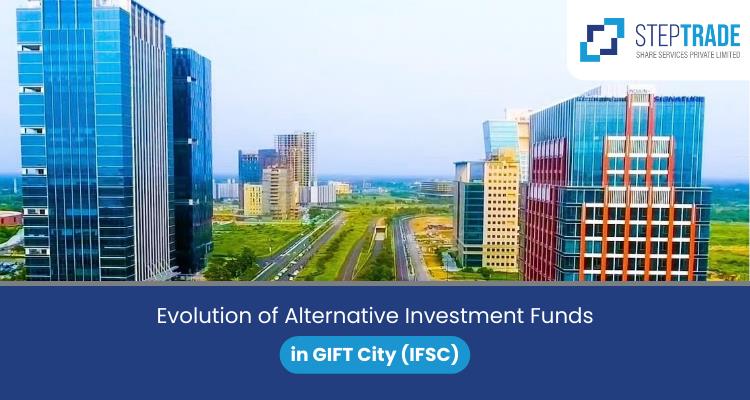Introduction
Alternative Investment Funds (AIFs) in India have witnessed remarkable growth in recent years, emerging as powerful tools for investors seeking diversification beyond traditional investment options. At the heart of this evolution stands GIFT City (Gujarat International Finance Tec-City), India's first International Financial Services Centre (IFSC).
This financial hub has transformed how AIFs operate in the country, offering a blend of global standards with domestic advantages. Thanks to forward-thinking regulatory frameworks, attractive tax incentives, and a business-friendly ecosystem, GIFT City has quickly become the preferred destination for Alternative Investment Funds in India. This transformation is redefining India’s investment landscape, unlocking opportunities for domestic and global investors alike.
Understanding AIFs – A Quick Overview
Alternative Investment Funds are privately managed investment funds that raise capital from informed investors in India and abroad, targeting specific investment strategies. Unlike regular mutual funds, AIFs cater to well-informed investors and can explore more diverse and complex investment strategies.
In India, AIFs are classified into three main categories:
- Category I AIFs: These focus on sectors with high growth potential and social impact. They include venture capital funds, SME funds, social venture funds, and infrastructure funds. The government offers incentives to these funds as they contribute to economic development.
- Category II AIFs: The most common type, including private equity funds and debt funds. These don't receive any specific incentives and typically invest in unlisted companies through equity or debt instruments.
- Category III AIFs: These employ complex trading strategies, often using leverage (borrowed money) to boost returns. Hedge funds fall under this category, focusing on short-term market opportunities.
The Securities and Exchange Board of India (SEBI) regulates AIFs in mainland India, establishing guidelines for their operation, investment approaches, and reporting requirements. These regulations ensure transparency and protect investor interests while allowing funds to implement diverse investment strategies. AIFs typically require a minimum investment of ₹1 crore, making them suitable for high-net-worth individuals (HNIs), institutions, and seasoned investors.
The Genesis of GIFT City and IFSC
GIFT City represents a bold vision to create India's first smart financial hub – a city built from the ground up with cutting-edge infrastructure, technology, and regulatory frameworks specifically designed for financial services. Located in Gujarat, this modern development aims to position India as a global financial powerhouse.
The International Financial Services Centre (IFSC) within GIFT City serves as a special financial zone that operates as if it were an offshore location while physically being in India. This unique positioning allows businesses to conduct international financial transactions that would typically happen in places like Singapore, Dubai, or London, but with the advantage of being in India.
AIF Regulations in GIFT City – A Turning Point
Key Regulatory Developments by IFSCA & SEBI
The International Financial Services Centers Authority (IFSCA) was established in 2020 as the unified regulator for all financial activities in GIFT City's IFSC. This marked a significant milestone, as previously, multiple regulators governed different aspects of financial services.
Unlike SEBI’s framework which caters to domestic compliance, IFSCA’s regulations are designed for international competitiveness, with faster registration timelines, simpler fund structures, and greater strategic flexibility. While SEBI regulations focus on protecting domestic investors and markets, IFSCA rules are designed to be globally competitive. The IFSCA framework offers greater flexibility in investment strategies, fund structures, and operational aspects.
The AIF registration process in GIFT City is streamlined compared to mainland India. Fund managers can typically complete registration within 4-6 weeks, significantly faster than the traditional SEBI process which can take 3-4 months. Additionally, the documentation requirements are simplified and better aligned with global standards, making it easier for international fund managers to establish their presence.
Types of AIFs Allowed in IFSC
GIFT City's IFSC allows all three categories of AIFs to operate, with each enjoying specific advantages:
- Venture Capital Funds (Category I): These funds benefit from special incentives when investing in startups and early-stage companies. They can invest both in Indian ventures and international opportunities, providing direct access to global venture capital networks.
- Private Equity Funds (Category II): These represent the largest segment in GIFT City, offering flexible structures for investing in unlisted companies across India and globally. The ability to deploy capital across borders with minimal restrictions makes these particularly attractive.
- Hedge Funds (Category III): These funds can employ sophisticated trading strategies, use leverage, and invest in a wide range of listed securities both in India and internationally. The regulatory framework in GIFT City allows these funds greater operational freedom than in mainland India.
Each type of AIF in GIFT City must follow specific investment and operational guidelines, but these are generally more flexible than their mainland counterparts, attracting fund managers seeking greater investment freedom.
Steptrade Capital has already established a strong foothold within GIFT City by offering customized AIF structures that align with IFSCA’s globally competitive regulations. With a focus on agility, compliance, and innovation, the firm is enabling investors to access high-growth opportunities through efficient fund vehicles designed for both local and international markets.
Why is GIFT City the Future for AIFs?
Tax Incentives and Domicile Benefits
GIFT City offers a highly attractive tax-neutral regime for non-resident investors. This means that non-residents investing in AIFs based in GIFT City don't face additional tax burdens beyond what they would in established international financial centers.
One of the most compelling advantages is the absence of capital gains tax on the transfer of AIF units by non-resident investors. This creates a level playing field with global financial hubs like Singapore and Dubai.
Fund managers also enjoy significant benefits, including a 100% tax exemption on income for the first 10 years of operation. This substantial incentive has attracted many fund management entities to establish their presence in GIFT City rather than setting up in offshore locations.
These tax benefits make GIFT City a competitive fund domicile in India, challenging traditional offshore centers while offering the advantage of being physically located in one of the world's fastest-growing major economies.
Global Investment Gateway
GIFT City is rapidly emerging as a cross-border investment hub, connecting international capital with Indian opportunities and vice versa. This positioning allows funds to tap into India's growth story while maintaining global flexibility.
Foreign Portfolio Investor (FPI) participation has seen remarkable growth, with many international investors preferring to route their investments through GIFT City thanks to its regulatory efficiency and tax benefits.
Beyond regulations and tax incentives, GIFT City offers world-class infrastructure designed specifically for financial services companies. Modern office spaces, reliable utilities, advanced telecommunications, and strong physical connectivity make it an attractive location for fund operations. The ease of doing business in GIFT City, with its single-window clearance system and dedicated support services, further enhances its appeal as a global financial center. Compared to Singapore or Dubai, GIFT City offers similar infrastructure and regulatory standards—while maintaining proximity to India’s high-growth markets.
Timeline of Evolution – AIF Milestones in GIFT City
- 2015–2020: Foundational infrastructure and policy framework established
- 2020–2022: IFSCA launched, first wave of AIFs approved
- 2023–2025: Rapid growth, key players like Steptrade Capital emerge
This evolution of Alternative Investment Funds in GIFT City represents one of the fastest-growing segments of India's financial ecosystem, with each phase building upon previous developments to create an increasingly sophisticated and globally competitive environment.
Conclusion
The rise of Alternative Investment Funds (AIFs) in GIFT City marks a transformative milestone in India’s financial journey. With world-class regulations, attractive tax incentives, and state-of-the-art infrastructure, GIFT City has become a top destination for fund managers and global investors alike.
Steptrade Capital showcases how this ecosystem can be leveraged to build innovative investment strategies. By focusing on underserved segments like SME Exchange investments and operating under the IFSCA framework, Steptrade offers a rare combination of global compliance and deep local expertise. Our success highlights how we, at Steptrade Capital, are unlocking high-potential opportunities and delivering strong returns through specialized fund management in GIFT City.
Let Steptrade Capital help you grow your investments—connect with us today.














